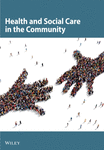Differentiated practice and specialization in community nursing: a descriptive study in the Netherlands
Abstract
Nursing roles are described with respect to two principles on the basis of an inventory study carried out in the Netherlands: differentiated practice and specialization. A total of 58 agencies for community nursing participated in this study (response = 84%). In each of these agencies an expert was asked to answer questions by telephone. The results show that a distinction is made between two levels of nurses working in the community: community nurses and community nurse auxiliaries. This distinction is based on the complexity of care, the range of responsibilities and a division between curative and preventive care (adult care vs. mother and child care). Assessment and diagnosis is reserved for nurses at the first level. Second level nurses are responsible for the other components of the nursing process. This study also showed that first level nurses regularly perform tasks that do not require a first level of expertise. It has become obvious with regard to specialization that the generalist work for first level nurses is diminishing: they have to choose either (curative) adult care or (preventive) mother and child care. First and second level nurses also have the opportunity of specializing in one or more patient categories. The aim of these “areas of special expertise” is to improve professionalism and patient care in community nursing. Based on the results of this study the use of measures to guarantee that the mix of staff meets the demand of care is recommended. In line with this, special measures have to be taken to upgrade the tasks of community nurses. In this respect the use of areas of special expertise and activities relating to coordination of care seem to be appropriate measures.




